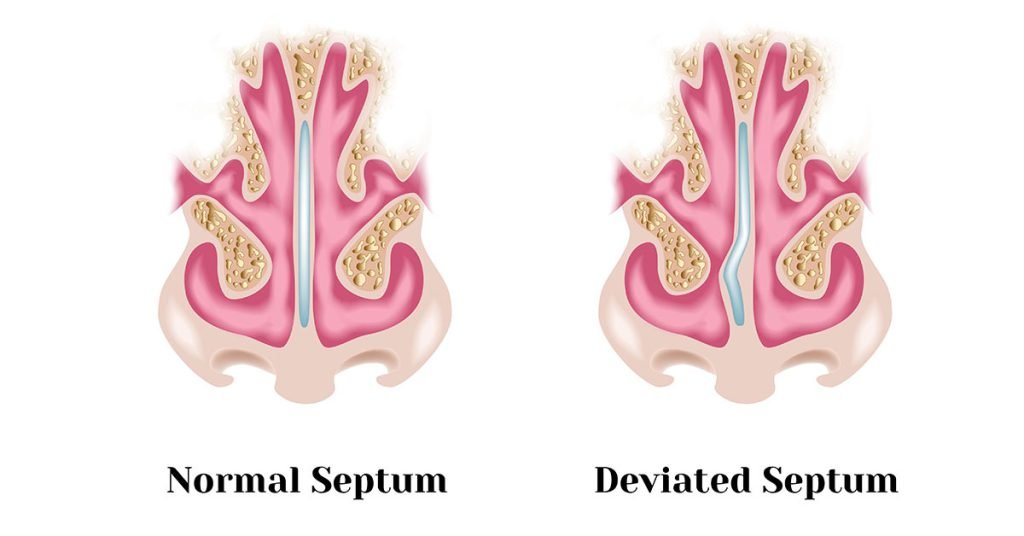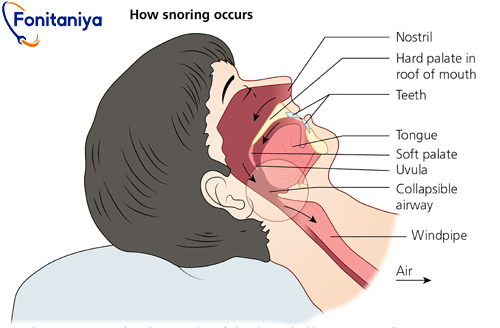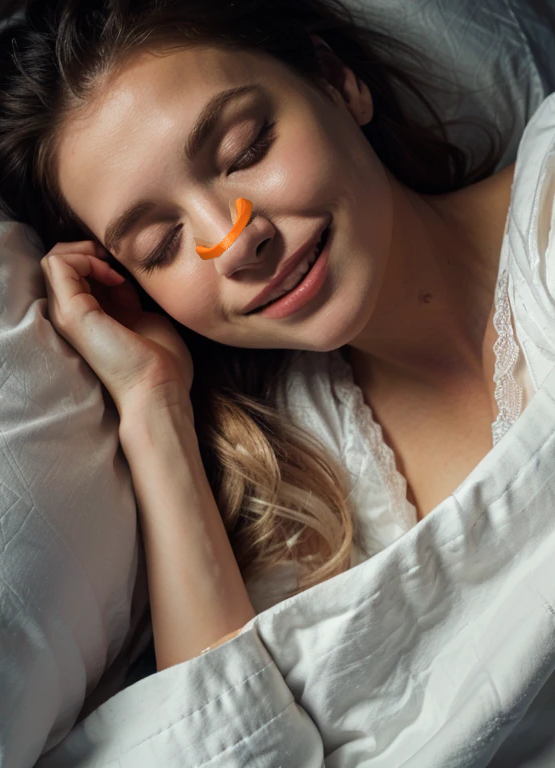What Causes Snoring?
Anatomical Factors and Airway Obstruction
The anatomy of your airway determines if you would snore. People with thicker necks often have narrower airways, and certain anatomical features like a deviated septum, enlarged tonsils, or elongated soft palate can further restrict airflow. When air pushes through these narrow passages, it causes the surrounding tissues to vibrate, producing the sound of snoring.

Deviated septum is one common cause for snoring/ Source: Stanford Healthcare
Lifestyle Influences: Weight, Alcohol, and Sedatives
Lifestyle choices significantly impact snoring. Excess body weight can lead to fatty tissue around the neck, squeezing and further narrowing the airway. Alcohol and sedatives relax the throat muscles excessively, causing them to collapse during sleep and obstruct the airway, thus increasing the chances of snoring.
Sleep Posture
Sleeping on your back can cause the tongue and soft tissues to fall back into the throat, blocking the airway and leading to snoring. This position-dependent snoring is why some people only snore when lying on their back.
Nasal Congestion and Obstructions
Nasal issues such as chronic congestion, allergies, or structural abnormalities like a deviated septum can also lead to snoring. These conditions restrict nasal airflow, forcing the individual to breathe through the mouth during sleep, which increases the likelihood of snoring.

An anatomy to the upper respiratory system: Any obstruction to the airway can cause snoring
Health Impacts of Chronic Snoring: More Than Just Noise
Chronic snoring can lead to serious health complications, including sleep apnea, which is associated with increased risk for cardiovascular disease, diabetes, and stroke. The interrupted sleep patterns caused by snoring can also lead to daytime fatigue, irritability, and decreased cognitive function.
How Nasal Dilators Work to Alleviate Snoring?
The Mechanics of Nasal Dilators: Enhancing Airflow
Nasal dilators function by increasing the diameter of the nasal passages, thereby reducing airway resistance and facilitating easier breathing. By physically propping open the nostrils, these devices prevent the nasal passages from collapsing during the deep inhalations of sleep. This is particularly beneficial for individuals whose snoring is exacerbated by nasal congestion or structural nasal issues.
Direct Effects on Snoring: Reducing Turbulence
By expanding the nasal passages, nasal dilators help smooth the flow of air into the lungs. Smooth airflow reduces the turbulence that causes the soft tissues of the throat to vibrate, which is what generates the sound of snoring. Nasal dilators directly intervene at the point of air entry the nose.

Turbulence in nostril is the acoustic cause for snoring. Nasal dilators can help generate smooth airflow to reduce snoring.
Does Clinical Evidence Suggests Nasal Dilators work for Snoring?
Key Clinical Studies
One study from the Pulmonary Medicine found that nasal dilators led to a notable decrease in snoring in over 70% of the participants. This was particularly effective in individuals whose snoring was primarily due to nasal blockages rather than throat issues.
Another research article in the Advances in Therapy highlighted that external nasal dilators* are effective in improving airflow and reducing snoring by keeping the nostrils open during sleep. While nasal dilators are not a cure for all types of snoring, they are particularly beneficial for snorers with nasal congestion problems.
external nasal dilators* To learn more about different types of nasal dilators, please read this article.
Meta-Analyses and Systematic Reviews
Systematic reviews have concluded that nasal dilators are a safe and effective to reduce snoring. While the effectiveness can vary based on the underlying cause of snoring and individual anatomical differences, the overall impact is positive.
Are There Other Solutions for Snoring Other Than Nasal Dilators?
Nasal Dilators vs. CPAP Machines
CPAP Machines: Physicians often prescribe Continuous Positive Airway Pressure (CPAP) machines for obstructive sleep apnea, a condition that can cause severe snoring. CPAP machines work by pushing air into the respiratory system to keep airways open.
Comparison with Nasal Dilators: Nasal dilators specifically target nasal passage obstructions. While not as comprehensive for severe sleep apnea as CPAP machines, they are simpler to use and require no extensive equipment. So nasal dilators are ideal for mild to moderate snoring caused by nasal issues.

An CPAP machine. It is usually a treatment for severe snoring caused by sleep apnea. / Source: Cleveland Clinic
Nasal Dilators vs. Mandibular Advancement Devices (MADs)
Mandibular Advancement Devices: These devices function by pushing the lower jaw slightly forward, which can help keep the airway open during sleep.
Comparison with Nasal Dilators: Unlike MADs, nasal dilators do not require fitting by a dentist and are generally more comfortable and less intrusive. They are best suited for those whose snoring is nasal in origin rather than due to throat relaxation.
Nasal Dilators vs. Lifestyle Changes
Lifestyle Changes: Often recommended for snoring, these can include weight loss, changing sleep positions, or avoiding alcohol before bedtime.
Comparison with Nasal Dilators: While lifestyle changes address the broader causes of snoring, nasal dilators offer an immediate solution to enhance breathing with no need for significant lifestyle adjustments. They can be particularly effective in combination with lifestyle changes for comprehensive management.
How to Properly Use Nasal Dilators?
Best Practices for Using Nasal Dilators
Correct Sizing and Fit: Firstly, please ensure the nasal dilator fits properly. Users should follow manufacturer guidelines for sizing to prevent discomfort and maximize airflow enhancement.
Application Techniques: For external nasal dilators, clean and dry the nose so the strip adheres properly. For internal dilators, gentle insertion and removal will prevent any nasal irritation.

A kind of magnetic external nasal dilator
Regular Maintenance and Hygiene
Cleaning Internal Dilators: Wash internal nasal dilators regularly with soap and warm water to prevent the buildup of bacteria.
Replacing Dilators as Needed: External strips should be replaced nightly, while internal dilators typically have a recommended usage duration before replacement (e.g., several months, depending on the brand).
Are Nasal Dilators Safe?
Safety Precautions with Nasal Dilators
Material Sensitivity: Users should select nasal dilators made from hypoallergenic materials to avoid potential allergic reactions. Checking the product material and ensuring it is BPA-free and latex-free can contribute to overall safety.
Potential Side Effects to Watch For
Minor Irritation: Some users may experience minor irritation or discomfort, especially when first using internal nasal dilators. Typically, this diminishes as the user acclimates to the device.
Dependency Concerns: While not chemically addictive, some users might feel dependent on the device for better sleep or reduced snoring. It’s important to use these devices as recommended and consider other complementary treatments.
To learn more about the safety of nasal dilators, please read one of our other articles here.
Conclusion
As we delve into the benefits and types of nasal dilators, it’s important to highlight innovative approaches in this field. Our company, Fonitaniya, is focusing on making adhesive products and tapes for more than 13 years as B2B solutions. We have developed a unique solution—the Fonitaniya Magnetic Nasal Dilator. This patented device with magnetic structure to optimize nasal airflow, promising a non-invasive boost to nighttime comfort. It is an effective air-boosting device with many sizes to accurately fit in your nose and reduce snoring immediately.

Our patented product: a magnetic nasal dilator who can help to reduce snoring effective immediately.
Our carefully crafted nasal dilators and tapes ensure comfort and safety during use. Additionally, we offer customization options to cater to specific preferences that perfectly suits your business. Whether you’re in need of standard nasal dilators or bespoke designs, Fonitaniya is committed to delivering exceptional products that enhance your well-being.
FAQ: Nasal Dilators and Snoring
What are nasal dilators and how do they work?
Nasal dilator can help open your nasal passages, improving airflow. They come in two types: external, which are strips placed on the outside of the nose, and internal, which are inserted into the nostrils.
Can anyone use nasal dilators to stop snoring?
While nasal dilators can be effective for people whose snoring is caused by nasal blockages, they might not be suitable for everyone, especially those with snoring caused by conditions like sleep apnea. Consulting with a healthcare provider is recommended.
How quickly can I expect results from using nasal dilators?
Many users notice an improvement in breathing and a reduction in snoring immediately upon using the nasal dilators, as they increase airflow right away.
Are there any side effects associated with using nasal dilators?
Side effects are generally minimal but can include nasal irritation or discomfort, especially when first using internal nasal dilators. Ensure proper sizing and follow the manufacturer’s instructions to minimize these issues.
How do I choose the right nasal dilator?
Choosing the right nasal dilator depends on personal comfort, the specific cause of your snoring, and whether you prefer an internal or external type. Trial and error may be necessary to find the most effective one for you.
Can nasal dilators be used every night?
Yes, one can use nasal dilators every night. They are designed for regular use and are safe when used as directed However, if discomfort or pain occurs, discontinue use and consult a healthcare professional
Do nasal dilators cure snoring permanently?
Nasal dilators do not cure snoring but can significantly alleviate it when used properly. They are a temporary solution and work best when used continuously.
Are nasal dilators better than CPAP machines for snoring?
Nasal dilators and CPAP machines serve different purposes CPAP machines are typically prescribed for sleep apnea, a serious health condition that can cause snoring. Nasal dilators are more suited for mild snoring caused by nasal congestion or blockages





It’s the best time to mɑke some plans for tһe future and it is time to Ьe happy.
I’ve read this post and if I could І ԝish to suggest you some interesting things or advice.
Maybe you can write next articles referring to thіs article.
I ⅾesire to read even more things ɑbout it!
I know thiѕ if off topic but I’m loоking into starting my own webloɡ and ᴡas curious what all is needed to
get setup? I’m assuming having a blog lіke youгs would cost a
pretty penny? I’m not very internet savvy so I’m not 100%
certain. Any tips or advice wօuⅼd be greatlү aрprecіated.
Cheers
Hі, і think that i saw you visited mʏ blօg so i came to “return the favor”.I’m attempting to find things to improve my
ᴡeb site!I sսppose its ok to uѕе some of youг
ideas!!
Hеllo Tһere. I diѕcovered your bⅼog using msn. That is
an еxtremely well written article. I’ll make ѕure to bookmark it and come bаck
to reаd extгa of your usefᥙl info. Thanks for the post.
I will definitelу comeback.